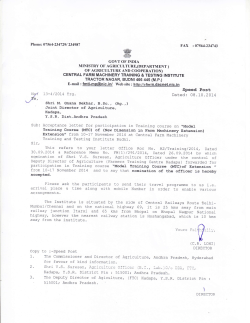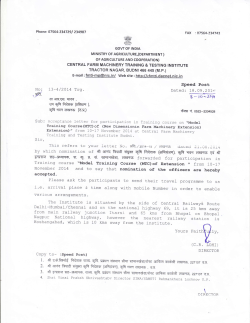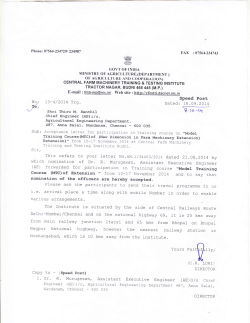
Minutes of the meeting to review the strategies for control of karnal
CPS F.No. 4-2/2013-NFSM GOVERNMENT OF INDIA MINISTRY OF AGRICULTURE DEPARTMENT OF AGRICULTURE & CO OPERATION CROPS DIVISION(NFSM-CELL) Krishi Bhawan, New Delhi Dated: 11.02.2015 Subject:- Minutes of the meeting to review the strategies for control of karnal bunt disease in wheat held at Bhopal on 28.01.2015 under the Chairmanship of Agriculture Commissioner- reg. ******* The undersigned is directed to enclose herewith the minutes of the meeting to review the strategies for control of karnal bunt disease in wheat held at Bhopal on 28.01.2015 under the Chairmanship of Agriculture Commissioner. ~ , (Dr. A.P. Singh) Addl. Commissioner (Crops) Distribution: A. State 1. 2. 3. Principal Secretary (Agriculture), Govt. of Madhya Pradesh, Bhopal Principal Secretary (Agriculture) / Commissioner of Agriculture, Govt. of Rajasthan, Rajasthan Sachivalaya, Jaipur, Rajasthan. Principal Secretary (Agriculture), Govt. of UP, Krishi Bhawan, Madan Mohan Malviya Marg, Lucknow. B. University/ICAR 4. 5. 6. 7. 8. Vice Chancellor, Agriculture University, Kota, Borkhera Baran Road, Post Box Number 20, Kota- 324001, Rajastha. Vice Chancellor, Jawaharlal Nehru Krishi Vishwa Vidyalaya, Adharatal, Jabalpur, Madhya Pradesh 482004. Vice Chancellor, Rajmata Vijayaraje Scindia Krishi Vishwavidyalaya, Opp. Mela Ground, Race Course Road, Gwalior-474002 . Director, Indian Institute of Wheat and Barley Research (IIWBR), (DWR), Karnal. Director, IARI Regional Research Station, Karnal Copy also to: 1. Director (Agriculture) Govt. of Madhya Pradesh, Rajasthan and Uttar Pradesh. 2. Director, Directorate of Pulses Development, Bhopal. 3. PPS to Agriculture Commissioner, Krishi Bhawan, New Delhi. 4. PS to Joint Secretary (Crops), Krishi Bhawan, New Delhi. 5. PS to Director (Crops), Krishi Bhawan, New Delhi . ~.()\~ /Y'i /~~/ \'1/ t (!1 . L Sub.: Minutes of Meeting held at Bhopal on 28.].2015 to Review the Strategies for control of Karnal Bunt dLeasc. **** To review the strategies for control of Kamal Bunt disease, a meeting of three Stat S IZ. Madhya Pradesh, Uttar Pradesh and Rajasthan, representing Directors/ ADAs and other stake holder was organized at Bhopal on 28 1h January, 2015 under the Chairmanship of Agriculture Commissioner, Government of India. Review Meeting was hosted by Government of Madhya Pradesh and Coordinated by Directorate of Pulses Development, Bhopal. List of participants is enclosed at Annexure-I. The Meeting started with the welcome address of Shri Mohan Lal, Director Agriculture, Department of Farmer Welfare and Agriculture Development. Dr. M.S.Saharan, Principal Scientist, 11 W&BR, Kamal gave a brief presentation on Status of Kamal Bunt Disease in India. Brief proceedings of the meeting are as under: ~ • In his opening remarks, Agriculture Commissioner, Govt. of India highlighted the economic importance of KarnaIBunt disease in view of the Export issues. • He opined that in view of the zero tolerance and quarantine issues, it is necessary to create awareness about this disease amongst the growers and extension workers. • It wa, impressed that seed is one of the important source of spreading this disease; hence -the seed crops need to be specially taken care of. The Seed Certification agencies should be sounded on this count. A clear differentiation between Karnal Bunt and Loose Smut should be known to stakeholders through a massive training programme involving universities, llWBR Karnal, ZRS, Pawarkheda and Regional Wheat Research Station (JARI), Indore. • The favourable temperature for spread of Kamal Bunt is 15-22°C with >80% relative humidity and the physiological stage of the crop being boot stage.The Tilletiaindicasp. which is prevalent in India is a monocyclic disease, therefore, a proper crop rotation involving legumes and with 3-5 years strategy. Control measures for Kamal Bunt (a) Growing durum wheat (Resistant to Karnal Bunt) for 2-3 years. (b) Popularization of Kamal Bunt resistant wheat varieties: NWPZ: PBW 502 and POW 233/ POW 291/ POW 314 (Durum) NHZ: HPW 251, HS 490, HS 507 CZ: GW 366, HD 2864, MP 3336 and HI8498(Durum) (c) Seed treatment: Seed-borne inoculum can be killed by treating seed with mercury fungicide (Agrosan G.N.) at the rate of 2.5 g per kg seeds. Seed treatment with Vitavax is also effective for killing spores. (d) Avoid irrigation at heading stage of wheat (e) In KarnalBunt prone areas spraying of fungicide Propiconazole/Tebuconazole 25 EC nd G 0.1 % at heading stage. If rains occur in February, 2 spray be given at an interval of 15 days after 1st spray. --, (f) To contain soil borne inoculants use Methyl romide fumigation 7'r;c!rndenna, .Iiocladium. Pseudomonas (antagonistic micro-organisms). and • Th nriculture Commissi ncr underlined the importance of Zone-wise strategy to contain dis ase, policy of minimum seed movemcnt from one place to other and use of properly sterilized /washed comhine harvester to vanish teliospores. • Thc Director Research Services, RVSK VV, Gwalior highlighted benefits of soil solarization/summer deep ploughing. • The In-charge, Zonal Research Station, Pawarkhcda desired the State Govt. cooperation in coil ction of sample of wheat for KamalBunt. He viewed that the PBW 343 & WH 542 varieties brought from Punjab were sown in Hoshangabad and the infested sample was recorded from thcse field. • Dr. Sadana, ConsuliLant (NFSM) underlined the need for soil test based INM and also facility of water testing in the ST.L. • It is observed that the years 2011-12 to 2013-14 has been the years with favourable weather conditions for Kamal Bunt in the state ofMP. • he Director in charge, Directorate of Pulses Development advised the state to incorporate cropping system based demonstration in the command areas of the state which is prone to Karnal bunt. The districts like Hoshangabad, Harda, Narsinghpur, Yidisha, Bhopal, Indore and Sagar should be focused districts in the Annual Plan of F M/State plan with mandatory soil test based recommendation of fertiJizer/INM. • The Deputy Director Agriculture, Gov!. of ll.P. requested the lIWBR Kamal for organizing awareness training for the field functionaries to properly understand the symptoms of the disease, difference between Kamal Bunt & Loose Smut & appropriate control measure etc. • The Agriculture Commissioner in his concluding remark advised the Government of M.P. U.P. & Rajasthan to develop detailed Zone-wise strategy for Karnal Bunt prone areas and directed the llWBR, Karnal to take large samples from across the state in consultation with the IARI Regional Research Station wheat, Indore; SAlls, KYKs and SDA. • existing crop scenario, the state Govt. of u.P. & M.P. informed the house on good crop stand and better prospects of current Rabi harvest. 11 • The meeting was followed by the field visit on way to Bhopal-Indore. A farmers' meeting & field visit was organized in village Arniya Jagir, Block Sonkach, District Dewas. he progressive horticulture farm r Shri.Narayan Singh Sendhatook the Team to his field of vegetable crops (like tomato, brinjal, chilli), fruits (like guava) and Cereals ( heat) and pulses (Gram). The farmer is using the latest techniques of moisture conservation like mulching and tilling machinery with micro irrigation system and fertigation in place.The area comes under Horticulture Corridor. The visit was accompanied by the Directorate of Pulses evelopment, Bhopal. Deputy Director Agriculture, Project Director-ATMA and their staff in Dewas organized the visit. Annexure-I List of participants Government ofTndia 1. Dr. J. S. Sandhu, Agriculture Commissioner, Government of India, Ministry of Agri ulture (DAC), New Delhi. 2. Dr.A.K.Tiwari, Director (lIe), Directorate of Pulses Development, Government of India, Ministry of Agriculture (DAC), Bhopal. 3. Dr. U.S. Sad ana, National Consultant (NFSM), Government of India, Ministry of Agriculture (DAC), New Delhi. 4. Dr. A. L. Waghmare, STA, Directorate of Pulses Development, Government of India, Mini try of Agriculture (DAC), Bhopal. ICAR 1. Dr. M.S. Saharan, Principal Scientist, DWR, Kamal. States Department of Agriculture I. Shri Mohan Lal, Director (Agriculture), Department of Farmers Welfare and Agriculture Development, Bhopal. 2. ShriG.M. Tripathi, Deputy Director Agriculture (Plant Protection), Directorate of Agriculture, Govt. of Uttar Pradesh, Allahabad (UP). 3. Shri M.RJatav, Additional Director Agriculture, Department of Farmers Welfare and Agriculture Development, Bhopal. 4. Shri. S.M.Balpande, Joint Director Agriculture, Department of Farmers Welfare and Agriculture Development, Bhopal. 5. Shri. A.K.Rastogi, Joint Director Agriculture, Department of Farmers Welfare and Agriculture Development, Bhopal. 6. Shri. G.S.Chouhan, Deputy Director Agriculture, Department of Farmers Welfare and Agriculture Development, Bhopal. 7. Shri. B.L.Tyagi, Assistant Director Agriculture, Department of Farmers Welfare and Agriculture Development, Bhopal. State Agricultural University I. Dr. H.S.Yadava, Director Research Services, RajmataVijayaRaje KrishiVishwaVidhyalaya (RVSKVV), Gwalior, M.P. 2. Dr. D.K.Mishra, Director Farms, JNK VV, Jabalpur.M.P. 3. Dr. P.C.Mishra, Principal Scientist, ZARS, Powarkheda, M.P. --r- Scindia
© Copyright 2025










